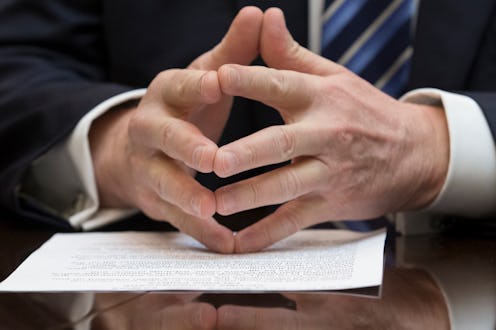News
Read These Theories On Trump's Tax Return Leak

When news broke on Tuesday that Rachel Maddow had obtained pages from Donald Trump's 2005 tax return and would be revealing them on her show, journalists and political pundits hoped to soon have answers about just how many of Trump's millions he's been paying to the federal government in taxes annually. While the documents do appear to, at least partially, answer this question, they also raise many more, most notably who leaked Trump's tax returns to Maddow in the first place?
David Cay Johnston, a Pulitzer Prize-winning investigative journalist and founder of the website dcreport.org, reportedly found the documents in his mailbox last week. While the documents were reportedly sent to him anonymously, Johnston has some pretty strong theories about who may have sent them.
"It is entirely possible that Donald sent this to me. Donald Trump has, over the years, leaked all sorts of things," Johnston told Maddow on Tuesday's segment of The Rachel Maddow Show. "It's a possibility, and it could have been leaked by someone at his direction. With Donald, you never know."
This theory may seem insane to anyone who knows anything about Trump's repeated refusal to release his tax returns throughout the 2016 presidential elections, despite repeated bipartisan calls to do so. But if we've learned anything from the past few weeks under a Trump administration, it's that just because something seems outrageous doesn't mean it's not true.
Many have taken to Twitter to expand upon Johnston's theory. One key piece of info being highlighted is that the second page of the documents clearly has a stamp that reads "Client Copy" near the bottom, suggesting that these documents may have belonged to the billionaire-president himself.
While the documents did reveal just how much money Trump earned in 2005 (spoiler alert: it's a lot) and that he paid roughly 24 percent of it in taxes that year, the pages don't reveal any juicy scandals about potentially shady business ties or tax evasions. Some think that this is precisely why Trump would have wanted to leak the documents himself: to try to prove that he has nothing to hide.
To be fair, that theory doesn't exactly hold up, as Trump could easily have leaked these lackluster documents months ago, and not in the middle of major international scandals that have interrupted his 50-days-in-office milestone. That brings us to the next theory, which is that Trump allegedly leaked these documents to distract the public from more controversial issues, like bipartisan criticism of the new health care plan or claims that Obama used microwaves to spy on Trump.
This theory can be pretty convincing, given all of the attention that the leaked tax returns received. DCReport, the website that published the full leaked documents, allegedly crashed soon after the information was put online due to high traffic.
All of this being said, the White House did release a statement shortly after the news broke that called Maddow's report an illegal, "desperate ploy for ratings," which makes me fairly certain that the president won't be claiming responsibility anytime soon — that is, if he had anything to do with the leak.
Despite this substantial income figure and tax paid, it is totally illegal to steal and publish tax returns. The dishonest media can continue to make this part of their agenda, while the President will focus on his, which includes tax reform that will benefit all Americans.
Maddow claimed the public deserved to know the tax info and that it was her first amendment right to provide it to them if Cay Johnston did indeed receive the documents anonymously, as he claimed he did. It may take us months to find out who is actually behind the leaked documents, and perhaps we'll never know the truth. Maybe the culprit is even the last person we would ever expect.
Regardless of who leaked the documents, this political whodunit will surely have journalists scratching their heads for at least the next few days trying to find the answer — and trying to find out more about Trump's tax history.